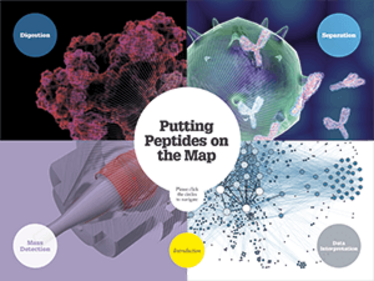Putting Peptides on the Map
Streamlined workflows help scientists plot a course for painless peptide mapping
To ensure patient safety, it is vital that biopharmaceuticals are comprehensively characterized. Peptide maps that detail the entire protein are required to prove molecular structure as well as determine post-translational modifications and sequence variants – a level of detail that can’t be obtained by intact mass analyses. Peptide mapping has a reputation as a slow and laborious process, but new technology is making it easier to get robust and reproducible results. Monoclonal antibodies and antibody–drug conjugates pose unique challenges, and require high peak capacity, high-resolution separations, reliable detection, and confident data analysis.
In this ebook, Thermo Fisher Scientific presents a series of case studies, detailing how advances in digestion, separation, mass detection and data interpretation are removing roadblocks in protein characterization. In each section, you’ll also find links to a wide range of resources, including videos, infographics and online articles.




















